Breaking the mold wasn’t easy, but here I am, sharing my journey.
I write to our blog, Modern Dads, because my story isn’t just mine. It’s a testament to a changing world. Once, I swapped my briefcase for a diaper bag, and haven’t looked back since. My name is John, and becoming the primary caregiver for my kids, Emily (8) and Liam (5), has been my most rewarding role.
Navigating this path was like learning a new language. At first, I stumbled, missing cues and making mistakes. But with each passing day, I got better. I learned that it’s not about being perfect but being present. Whether it’s mastering the art of packing the perfect lunch or knowing just how to soothe a scraped knee, these moments define my days.
The world around us often expects dads to play the sideline in parenting. But here I am, proving that narrative wrong, one school pickup at a time. It’s about showing up, being vulnerable, and embracing every bit of this journey.
A Day in the Life of a Modern Dad
Just last week, Emily had her science fair. The night before, as we were putting the finishing touches on her volcano project, she looked up at me with those big eyes full of wonder and said, ‘Dad, do you think we’ll win?’
It wasn’t just about the competition; it was about us, tackling challenges and celebrating small victories, together. In that moment, I saw the impact of my role.
The way her eyes lit up when I showed her how to mix just the right amount of baking soda and vinegar reminded me why I chose this path. Being there for Emily and Liam, supporting my wife in her career, and breaking stereotypes along the way has been an adventure.
This is what being a stay-at-home dad is about. It’s about the laughter, the tears, and everything in between. It’s a choice I made, and one I’d make again in a heartbeat.
Key Takeaways
- Male caregivers challenge stereotypes and societal norms in caregiving roles.
- Seeking support systems and resources is crucial for male primary caregivers.
- Prioritizing mental health and emotional well-being is essential for male caregivers.
- Positive media portrayal and redefining masculinity empower male caregivers.
Misconceptions and Stereotypes
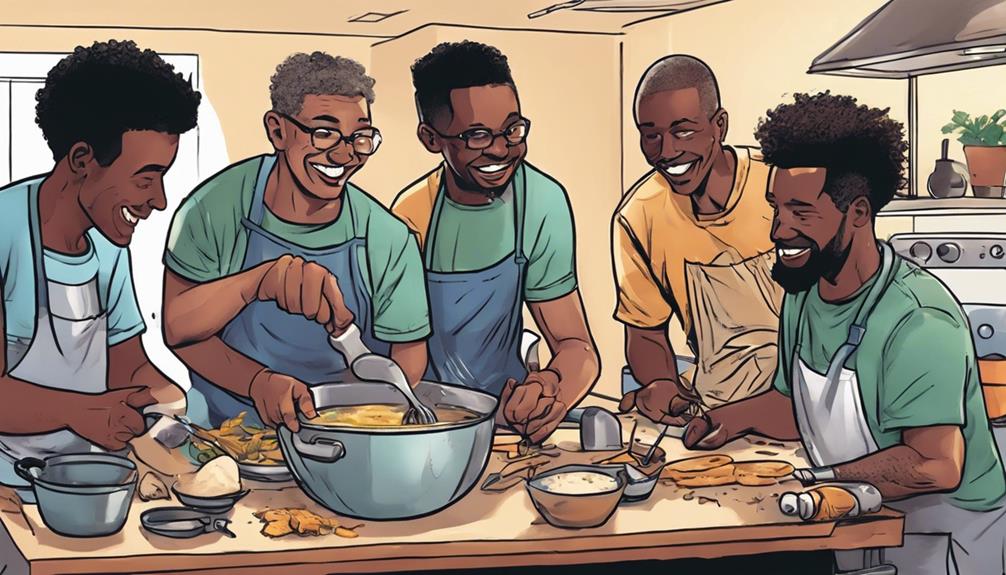
Misconceptions and stereotypes surrounding male primary caregivers often stem from outdated societal norms and limited exposure to diverse family dynamics. Challenging stereotypes and breaking misconceptions is crucial in fostering a more inclusive and understanding environment for all caregivers.
As a male primary caregiver, you may encounter preconceived notions that men are less nurturing or capable of providing sensitive care. It’s essential to remember that caregiving skills aren’t bound by gender but are a reflection of individual abilities and dedication.
Societal Norms and Expectations
Navigating societal norms and expectations as a male primary caregiver can present unique challenges and opportunities for growth and understanding. Gender roles and cultural beliefs often dictate that caregiving is a role more suited for women, leading to misconceptions and stereotypes about male caregivers. However, breaking these norms can pave the way for a more inclusive and diverse caregiving landscape.
As a male primary caregiver, you may encounter resistance or judgment from those who hold traditional views on gender roles. It’s important to remember that societal expectations are evolving, and your role as a caregiver is valuable regardless of gender. Embracing this role can challenge outdated beliefs and inspire others to do the same.
Media Portrayal and Influence
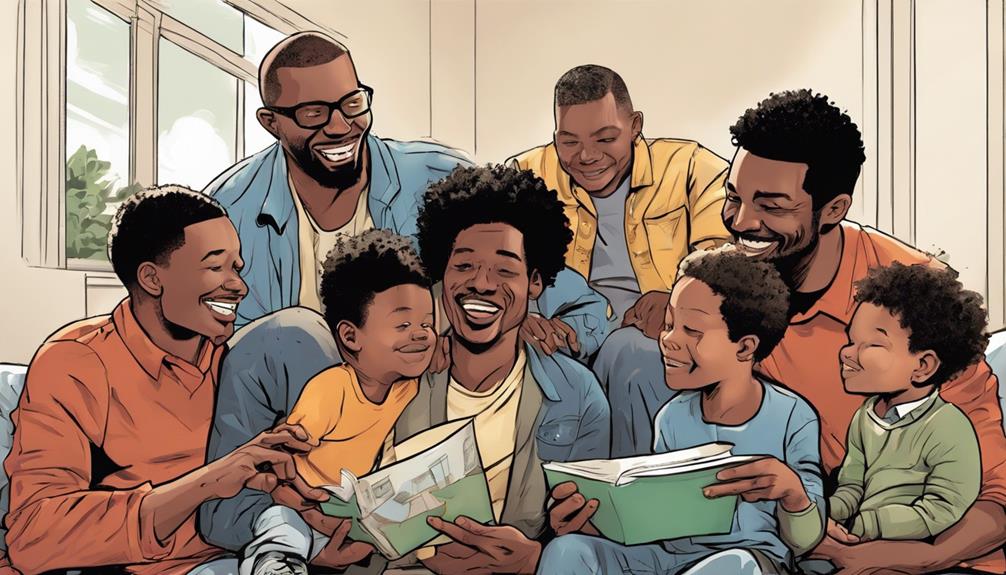
Breaking stereotypes and challenging societal norms as a male primary caregiver, you may find that media portrayal and influence play a significant role in shaping perceptions and attitudes towards your caregiving role. Media representation and societal norms can either reinforce traditional gender roles or help break them down, impacting how male caregivers are viewed in society.
Cultural influences embedded in media content can affect how individuals perceive your role as a primary caregiver. To navigate these influences effectively, consider the following:
- Diverse Representation: Look for media that showcases a variety of caregiving roles performed by males.
- Question Stereotypes: Challenge traditional gender norms portrayed in the media and advocate for a more inclusive representation of caregiving responsibilities.
- Seek Supportive Content: Engage with media that positively portrays male primary caregivers to feel validated and understood.
- Educate Others: Use media influence as a tool to educate others about the importance of breaking gender stereotypes in caregiving.
- Promote Empathy: Encourage media that fosters empathy towards male caregivers, promoting a more supportive and understanding environment.
Impact on Family Dynamics
Considering the pivotal role male primary caregivers play within the family unit, their influence on family dynamics is profound and multifaceted. Family relationships are deeply impacted by the active involvement of male caregivers, as they bring a unique perspective and set of experiences to the table. Communication within the family often becomes more open and inclusive, fostering a supportive environment where everyone feels heard and understood.
Moreover, the presence of male primary caregivers can challenge traditional gender roles and parenting dynamics within the family. By actively participating in caregiving responsibilities, they help break down stereotypes and promote a more egalitarian division of labor. This shift can lead to a more balanced and harmonious family dynamic, where each member feels valued for their contributions regardless of gender.
Support Systems and Resources
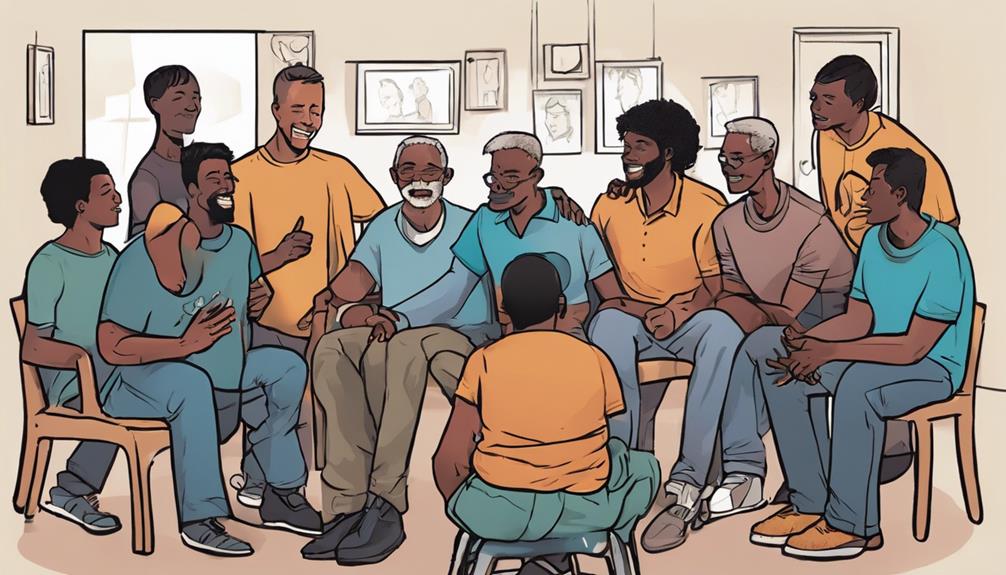
Support systems and resources are essential for male primary caregivers to effectively navigate their roles and responsibilities within the family structure. As you embark on this journey of caregiving, remember that seeking support is a sign of strength, not weakness. Here are some key resources that can assist you in this role:
- Community Networks: Engage with local community groups or online forums where you can connect with other male caregivers facing similar challenges. Sharing experiences and advice can provide a sense of belonging and understanding.
- Mental Health Services: Prioritize your mental well-being by seeking professional help if needed. Therapy or counseling can offer valuable support in managing stress and emotions.
- Self-Care Practices: Remember to take care of yourself physically and emotionally. Make time for activities that bring you joy and relaxation, ensuring you have the energy to fulfill your caregiving duties.
- Support Groups: Joining a support group specifically for male caregivers can offer a safe space to share feelings, gain insights, and receive encouragement from peers.
- Educational Resources: Stay informed about caregiving techniques, resources, and rights. Knowledge empowers you to make informed decisions and advocate for your loved one effectively.
Role Reversal and Adaptation
Navigating the shift in familial roles and adapting to new responsibilities can be a challenging yet transformative experience for male primary caregivers. As you step into a role traditionally less explored by men, you may encounter various adaptation challenges. From learning new caregiving skills to managing household tasks, the adjustment period can feel overwhelming at times. However, through perseverance and a willingness to adapt, you can discover a newfound sense of fulfillment and purpose in caring for your loved ones.
While role reversal may bring about its share of challenges, it also offers a unique opportunity for personal growth and deeper connections with your family members. Embracing these role reversal benefits can lead to a more equitable distribution of caregiving responsibilities within the household. By facing these challenges head-on and seeking support when needed, you aren’t only reshaping traditional gender norms but also fostering a more harmonious and inclusive family dynamic. Remember, adaptation is a process, and it’s okay to take one step at a time towards navigating this new chapter in your caregiving journey.
Psychological and Emotional Well-being
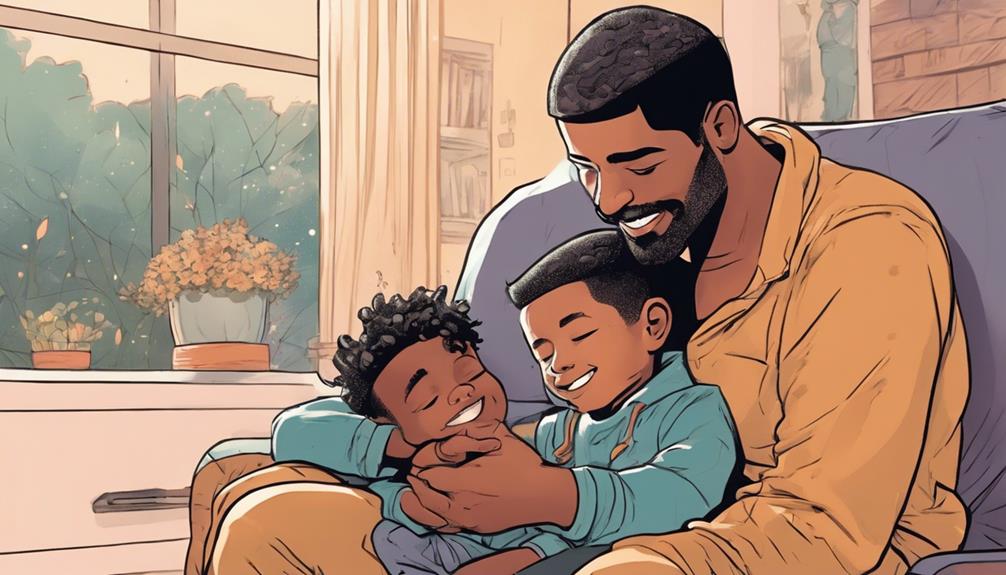
As you navigate the challenges of stepping into the role of a male primary caregiver, it’s crucial to prioritize your psychological and emotional well-being to ensure a sustainable and fulfilling caregiving journey. Your mental health should be a top priority as you care for your loved one.
Here are some key points to consider:
- Mental Health: Understand that your mental health matters. Seek support if needed, whether through therapy, support groups, or talking to a trusted friend.
- Coping Strategies: Develop healthy coping strategies to deal with the stress and emotional challenges that may arise in your caregiving role.
- Stress Management: Practice stress management techniques such as deep breathing, mindfulness, or engaging in activities that bring you joy and relaxation.
- Self-Care: Remember to take care of yourself. Prioritize self-care activities that recharge you physically, mentally, and emotionally.
- Seek Help When Needed: Don’t hesitate to ask for help or delegate tasks. It’s okay to not do everything on your own.
Overcoming Stigma and Judgment
To thrive as a male primary caregiver, it’s essential to confront and rise above any stigmas or judgments that may come your way. Parenting challenges can be compounded by societal expectations, leading to public perceptions that may not align with your reality. Coping strategies are crucial in navigating these waters. Remember, personal growth often stems from overcoming adversity. Embrace the opportunity to educate others about the diverse roles individuals can play in caregiving.
When faced with stigma or judgment, it’s normal to feel hurt or discouraged. However, try to reframe these experiences as opportunities for growth. Seek support from fellow caregivers, friends, or professionals who understand and respect your choices. Remember, your worth as a caregiver isn’t determined by outdated gender stereotypes. By staying true to yourself and your role as a caregiver, you’re breaking down barriers and redefining what it means to be a nurturing father figure. Embrace the journey of self-discovery and let it empower you to be the best caregiver you can be.
Redefining Masculinity and Fatherhood
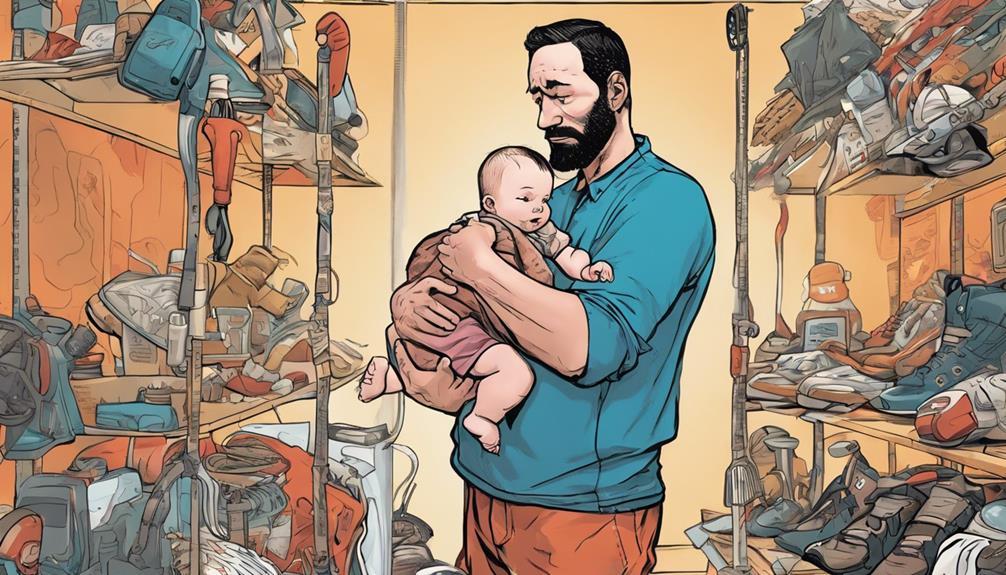
Consider embracing a modern perspective on masculinity and fatherhood to redefine traditional roles and foster a nurturing environment for both yourself and your loved ones. In today’s society, there’s a shift towards breaking down rigid gender roles and embracing a more inclusive approach to parental responsibilities.
Here are some key points to consider as you navigate this journey:
- Challenge Stereotypes: Break free from societal norms that dictate how a father should behave and instead focus on what works best for you and your family.
- Embrace Vulnerability: It’s okay to show vulnerability and express emotions as a father. This can create deeper connections with your children and partner.
- Share Responsibilities: Parenting is a shared responsibility. Be open to dividing tasks equally with your partner to create a balanced environment.
- Lead by Example: Show your children that there’s strength in kindness, compassion, and empathy.
- Seek Support: Surround yourself with a supportive community that values and encourages your role as a male caregiver.
Future Outlook and Progress
Looking towards the future, embrace the evolving landscape of caregiving with a renewed sense of purpose and dedication. As attitudes towards male primary caregivers continue to evolve, it’s essential to recognize the changing perspectives that shape the caregiving narrative. The progress made in challenging traditional gender roles within caregiving signifies a positive shift towards inclusivity and support for all caregivers, regardless of gender.
Keep moving forward with confidence, knowing that your commitment to caregiving is helping to redefine what it means to be a male primary caregiver. Your willingness to challenge traditional norms is creating a more accepting and diverse caregiving community for future generations to come.
Break Stereotypes About Stay-at-Home Dads
Male primary caregivers have the power to debunk myths about stay-at-home dads. By taking on this role, they challenge the stereotype that caregiving is solely a woman’s job. Their involvement in parenting and household duties can reshape societal perceptions and pave the way for more equitable parenting responsibilities.
How Can Male Primary Caregivers Regain Their Self-Identity?
Male primary caregivers face the challenge of regaining self-identity as stay-at-home dads amidst societal expectations. Seeking support from other fathers and creating a routine that allows personal exploration can be beneficial. Taking time for hobbies and self-care, and setting boundaries with work and family responsibilities can also help in this journey.
Conclusion
I’ve noticed more dads staying at home these days, almost double in the last 10 years. It’s a big shift from old norms, showing guys can also rock the caregiving gig. We need to keep cheering them on to make sure everyone feels welcome in any role.
Have you or someone you know taken on the role of a primary caregiver? I’d love to hear about your experiences and any advice you might have. Please share your stories in the comments below.
And, if you found this insight as interesting as I did, help us spread the word by sharing this post on your social media. Let’s get the conversation going on Modern Dads!

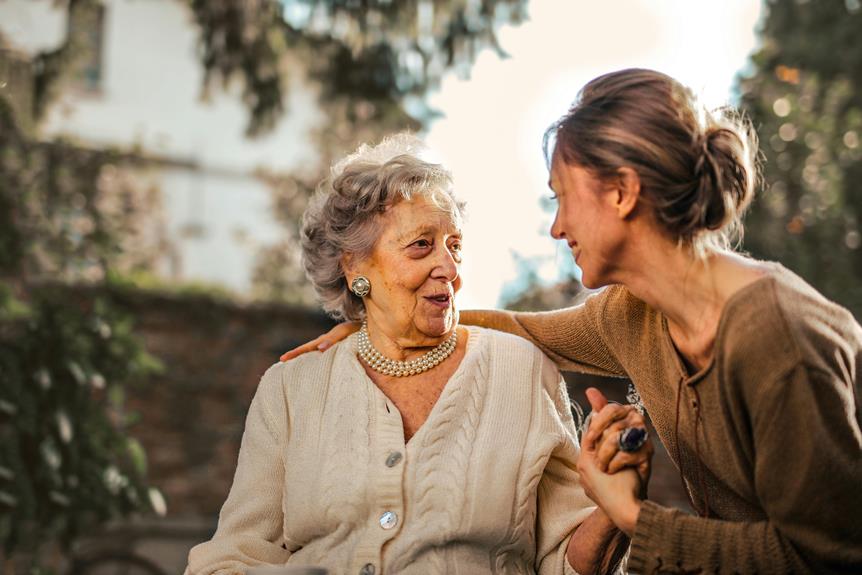
Leave a Reply